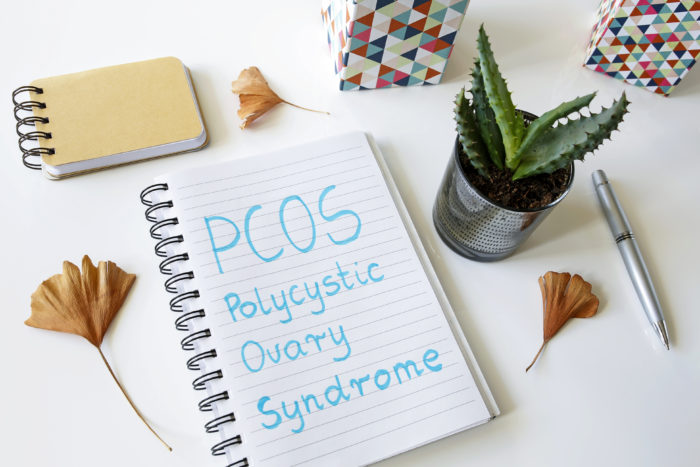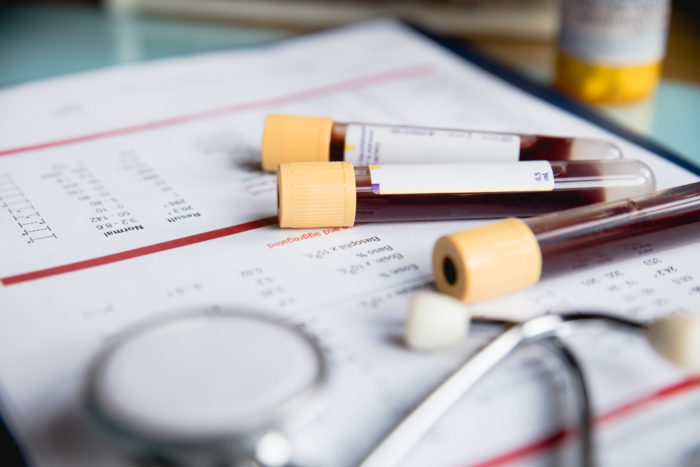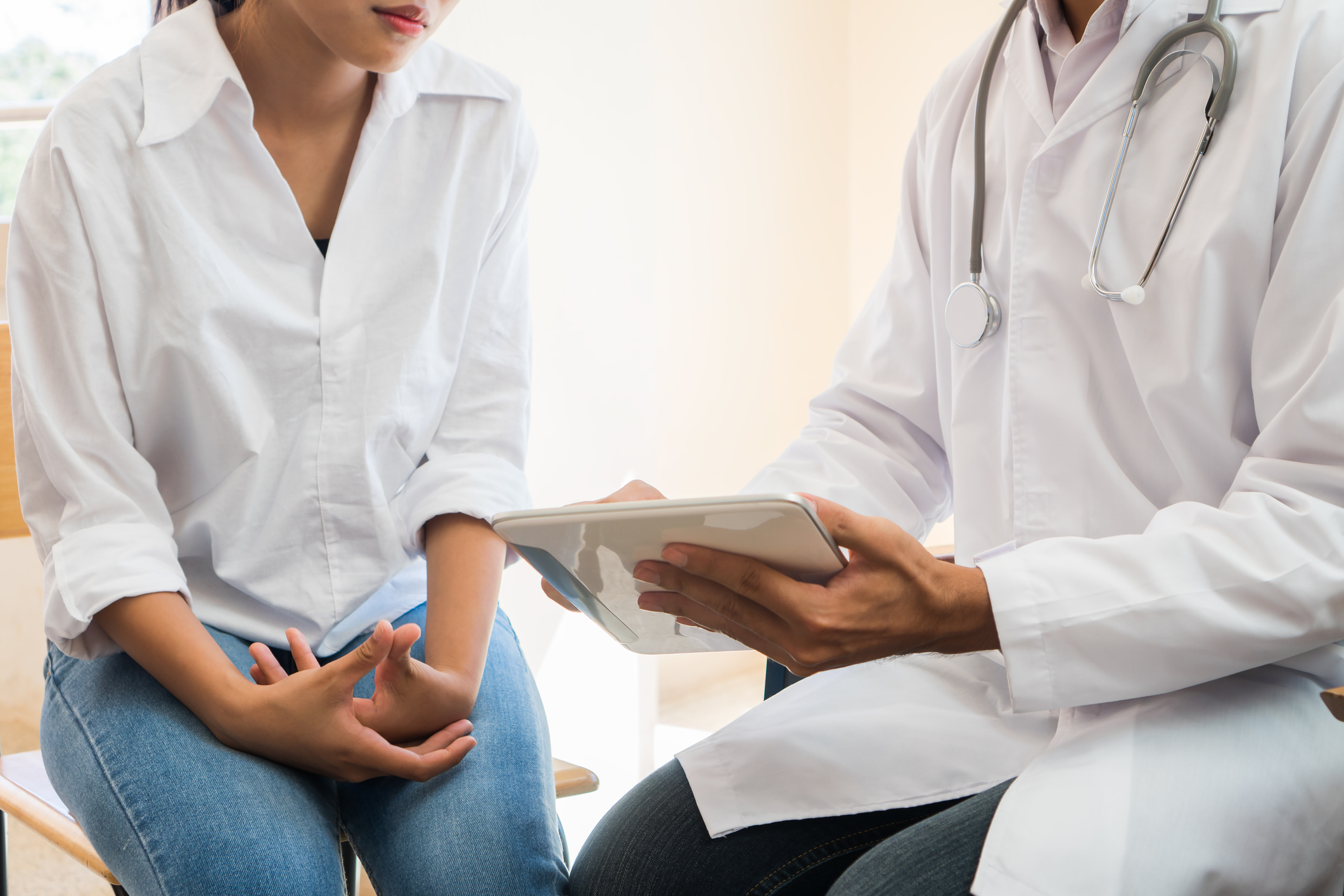PCOS is an umbrella diagnosis for a variety of different root causes. It can be difficult to treat your specific type of PCOS unless you know what type you have and what might be causing it.
This article will walk you through how to identify the type of PCOS you’re dealing with. You’ll leave armed with the knowledge of how to test for and treat this condition naturally (without going on the pill)!
No two cases of PCOS are the same. PCOS is less of a diagnosis and more of a broad syndrome with various underlying causes. This makes it one of the more difficult conditions to both diagnose and treat successfully.
And unfortunately, many conventional doctors will use the same treatment modality for all cases of PCOS that they see. Regardless of the underlying cause.
This can sometimes be effective for masking the symptoms. But using one treatment for PCOS makes it difficult to get to the root of the condition.
By digging a little deeper into your health history and evaluating certain lab results, we can identify and treat the root cause of your PCOS.
In this article, you’ll learn…
- What is PCOS?
- 3 Diagnostic Criteria For PCOS
- Dr. Lara Briden’s Four Types of PCOS
- Recommended Lab Testing for PCOS
- How To Treat Your Type of PCOS
If you’re ready to get to the bottom of your PCOS and start treating what’s really causing your symptoms, let’s go!

What is PCOS?
Contrary to what the name implies, Polycystic Ovarian Syndrome (PCOS) involves so much more than an issue with your ovaries. And in fact, having cysts on your ovaries is actually somewhat meaningless when it comes to your health.
Read that again: cysts on your ovaries can be normal and PCOS cannot be diagnosed from an ultrasound!
As my friend Dr. Lara Briden explains:
The term ovarian cyst just means a fluid-filled sac within the ovary, and there are many different types—all with different treatments.
For example, some so-called “cysts” are really just follicles or eggs, which are normal for the ovary. The best example is the “polycystic ovary” which are normal follicles and not actually cysts in any real sense of the word.
In other words, PCOS is not caused or diagnosed by having cysts on your ovaries.
PCOS is an endocrine disorder generally associated with a lack of ovulation. Its symptoms are diverse and could be caused by a myriad of other conditions.
This misleading name and non-descript symptoms are the main factors behind the misdiagnosis and underdiagnosis of so many women with PCOS.
Determining if you have PCOS by symptoms alone is usually unsuccessful.
Some of the most common symptoms of PCOS include:
- Irregular or missing periods
- Abnormal hair growth (face, chest, back)
- Male-pattern hair loss
- Weight gain or difficulty losing weight
- Acne
- Infertility
- Blood sugar imbalances
Yet most women with PCOS won’t experience all or even a majority of these symptoms. And many of these symptoms could be caused by other conditions like hypothyroidism, diabetes, gut imbalances, eating disorders, and more.
That’s why further evaluation is crucial when it comes to identifying and treating your type of PCOS.

Diagnostic Criteria for Treating PCOS
The diagnosis of PCOS is not black and white. There’s no one test that either says “yes, you have PCOS”, or “no, you don’t.”
Instead, practitioners have to use a series of diagnostic criteria to make a PCOS diagnosis. And as I mentioned before, having cysts on your ovaries is not a requirement to have PCOS.
To get a confirmed diagnosis of PCOS based on current guidelines, you must fall into two of these three categories.
1. You have irregular periods.
When it comes to menstrual cycles, “irregular” can mean a few things.
Either your period will be missing altogether, a condition called amenorrhea, or your cycle will be shorter or longer than the typical 21-35 days.
With PCOS, cycles are typically longer than 35 days and anovulatory (lacking ovulation) or altogether nonexistent.
Of course, a completely missing cycle could actually be hypothalamic amenorrhea, not PCOS.
2. You have elevated androgen levels as shown through a blood test.
Androgens are often referred to as “male sex hormones,” although they’re present in both men and women in differing amounts.
Hormone testing for PCOS will check for elevated levels of testosterone, FSH, DHEA, and DHEA-S. (We’ll dive more into testing for PCOS in a few minutes.)
3. You have cysts on your ovaries.
Unlike the name implies, ovarian cysts are usually the least common diagnostic criteria met for PCOS.
This criteria is so unhelpful that the National Institute of Health has even recommended changing the name of this disorder. They suggest the name should better reflect its complexity, not just the presence of ovarian cysts.
And just because you have cysts show up on an ultrasound, does NOT mean you have PCOS. You need to also meet at least one of the other two criteria to get diagnosed with this condition.

Dr. Lara Briden’s Four Types of PCOS
As you can see, there’s a lot of ambiguity around getting a firm PCOS diagnosis. And even if you do get an official diagnosis of PCOS, an effective treatment is dependent on knowing what caused the condition in the first place.
Dr. Lara Briden, a friend and women’s health expert, has identified four distinct types of PCOS. And with my clinical experience helping women overcome this condition, I agree with the notion of splitting PCOS into these four subtypes.
PCOS can accompany a wide range of symptoms. And your treatment plan will vary significantly depending on why you developed PCOS.
Each type of PCOS will need different methods of treating its root cause. The treatment that will work for one type of PCOS may not work for another.
This is why it’s so important to identify the specific type of PCOS you’re dealing with. Without that knowledge, treating PCOS can be like taking a shot in the dark.
And sometimes the conventional treatments can make things worse!
This is one of the reasons why conventional doctors prescribe birth control as a catch-all PCOS “treatment.” By suppressing your natural hormone fluctuations, you can mask the symptoms of hormone dysfunction. And birth control is designed to stop ovulation – the very same issue that causes PCOS in the first place!
For most women, common guidelines like birth control, low carb diets, and weight loss will only make their PCOS worse.
Here is a quick overview of Dr. Lara’s novel look at the four types of PCOS.

Insulin Resistant PCOS
If you have high insulin levels, resulting in insulin resistance, metabolic syndrome, or pre-diabetes AND suffer from PCOS symptoms, you likely have Insulin Resistant PCOS.
Symptoms of having high insulin include:
- Extreme thirst
- Feeling hungry even after a meal
- Increased urination
- Fatigue
- Tingling in hands and feet
- Skin tags
- Dark, velvety skin (acanthosis nigricans)
Higher than normal insulin levels are what’s driving your excessive androgen production, resulting in PCOS symptoms.
Insulin resistance can occur as a result of excessive calorie intake, a too high or too low carb diet, stress, excess body fat, chronic inflammation, and even genetics.
And insulin resistance doesn’t always have to lead to PCOS. You can have insulin resistance without having PCOS. But when they both occur together, your body’s resistance to insulin is what’s likely driving your PCOS.

Post-Pill PCOS
Post-Pill PCOS occurs as a part of Post-Birth Control Syndrome once you come off birth control.
If your periods were normal before you went on the pill, but changed into ones that resemble PCOS after you stopped, this is likely your root cause.
Would you like to save this post?
Your email address is 100% safe and will never be sent spam.
Hormonal birth control works to suppress your own natural hormonal fluctuations. And once you stop taking the pill, your body needs some time to get back into its own normal rhythm.
PCOS can arise when your body responds to you stopping the pill by producing excess androgens.
This surge in androgens, along with the diagnosis of PCOS, is usually temporary, as long as you remain hormonal birth control-free.

Inflammatory PCOS
Chronic inflammation can stimulate your ovaries to make an excess of testosterone, resulting in PCOS-like symptoms.
If this chronic inflammation results in a PCOS diagnosis, you have Inflammatory PCOS.
Some common signs of chronic inflammation are:
- Unexplained fatigue
- Digestive issues
- Allergies
- Brain Fog or Headaches
- Chronic skin conditions
- Chronic injuries
- Joint or muscle pain or stiffness
- Water retention
Once you identify and correct the source of chronic inflammation, your PCOS symptoms should subside as well.
For some, this can mean treating hidden gut infections, and for others, it might mean cutting back on processed foods. There are many reasons a person might be experiencing chronic inflammation, and working with an experienced practitioner can help you identify the underlying problem.
No matter what the cause, reducing your body’s inflammatory load can help resolve your PCOS.

Adrenal PCOS
Adrenal PCOS is possibly the least common form of PCOS, but one that I personally have dealt with in the past.
You likely have this form of PCOS if your symptoms flare during an increase in stress.
When your adrenal glands respond to stress, they produce their own androgens, often resulting in PCOS symptoms.
With Adrenal PCOS, your body’s abnormal response to stress results in elevated DHEA-S, but you’ll often see normal testosterone and androstenedione. This distinction can help you determine that you’re dealing with Adrenal PCOS versus another type.
Keep in mind, if you’re like me, you may have PCOS-like tendencies like slightly higher testosterone and/or estrogen. But you might only experience the symptoms of PCOS when you’re under a lot of stress!

Recommended Lab Testing for PCOS
Lab testing is a must to determine which type of PCOS you’re dealing with.
Without a deeper look at what’s going on inside your body to cause those external PCOS symptoms, you can’t begin treating the root cause.
With that being said, if you think you’re dealing with PCOS, I recommend asking your personal healthcare provider to order the following lab tests.
DHEA, S/Testosterone, Free
- Dehydroepiandrosterone (DHEA) and Testosterone are two of the most prominent androgens. Symptoms like abnormal or excess hair growth, male pattern baldness, and even menstrual irregularities result from increased levels of these particular androgens.
Luteinizing Hormone (LH) and Follicle Stimulating Hormone (FSH)
- LH and FSH are hormones that encourage ovulation. Low or imbalanced levels of these hormones cause both infertility and irregular periods.
Progesterone
- Progesterone helps prepare the uterine lining for pregnancy. Low levels of Progesterone usually show that ovulation did not occur and no egg was released.
Estradiol
- This is the most active estrogen in the female body and is mainly secreted by the ovaries. Estrogen and Progesterone work together to promote menstruation. Some women with PCOS find that their estrogen levels fall within a normal range.
Hemoglobin A1c
- Useful to reveal your average blood sugar levels over the past ~3 months, letting you know if you are headed towards prediabetes or diabetes.
Cortisol
- High cortisol levels can lead to symptoms such as weight gain, hypertension, high blood sugar, osteoporosis, and fragile skin. Low levels of cortisol may cause weight loss, weakening of muscles, fatigue, low blood pressure, vomiting and diarrhea and loss of consciousness.
Fasting Insulin
- If a person makes too little insulin or is resistant to its effects, cells starve. If someone makes too much then symptoms of low blood glucose (hypoglycemia) can emerge. High insulin is a sign of potential insulin resistance.
Fasting Glucose
- To detect high blood glucose (sugar) and low blood glucose as a pre-screen for diabetes and blood sugar imbalances. Women with PCOS are much more predisposed to diabetes.
Prolactin
- To evaluate menstrual irregularities and infertility in women. Prolactin often goes up in times of stress.
Thyroid Markers (TSH, Free T3, Free T4, TPO)
- Many times women with symptoms of PCOS may have an underactive thyroid. In fact, hypothyroidism (particularly low T3) could be the main reason you have irregular cycles, weight gain, and other PCOS-like symptoms.
Sex Hormone Binding Globulin
- To help check for excess testosterone production in women. High levels of testosterone can cause a variety of PCOS symptoms like irregular cycles.
Some providers may not be comfortable running and interpreting all these tests for what they view as a simple PCOS diagnosis.
If that’s the case, you can also order these tests yourself, here. The PCOS Complete Panel or PCOS Basic Panel are going to be the most beneficial for starting to treat your type of PCOS.
I strongly encourage you to bring these results to an experienced functional medicine provider to help you sort out your results and come up with a plan for improving your PCOS symptoms.

How to Treat Your Type of PCOS
Once you’ve identified your type of PCOS, it’s time to start treating it.
The benefit of determining what type of PCOS you’re dealing with is that you’re now able to treat the exact root cause, not just the symptoms.
By targeting the underlying cause of your PCOS, you’ll have a much better chance of seeing complete symptom relief and taking control of your PCOS for good.
Of course, working with a trusted practitioner is going to be your best bet for treating your PCOS. But here are some initial steps you can take to healing the underlying cause of your symptoms.
To Treat Insulin Resistant PCOS
Treatment for Insulin Resistant PCOS centers around reversing the insulin resistance that is behind the excessive androgen production.
Taking steps to improve insulin sensitivity can be as simple as exercising more, getting enough sleep, reducing stress, and eating more real foods. A low carb diet can be effective for many women with insulin-resistant PCOS.
You can also supplement with magnesium and inositol to help balance your insulin response. Here is a trusted distributor of my go-to supplements.
To Treat Post-Pill PCOS
Unfortunately, the best treatment for Post-Pill PCOS is time.
It can take up to three months for your hormones to recover after birth control use. And if your PCOS symptoms started when you stopped birth control, this timeline applies to you too.
You can also support your hormones and help your body reduce those excess androgens through targeted supplementation.
I recommend using anti-androgen supplements like zinc, DIM, peony, and licorice, which you can buy here.
Dr. Jolene Brighten has a great book on recovering from post-birth control syndrome.
To Treat Inflammatory PCOS
To treat inflammatory PCOS you have to identify the cause of your chronic inflammation.
Common sources of inflammation are food sensitivities, gut conditions, and stress.
It can be difficult to know exactly what is behind your chronic inflammation. But you’ll be able to tell you’re on the right track when you see a reduction in your PCOS symptoms.
Follow an anti-inflammatory diet. Supplementing with zinc and NAC can also be helpful in reducing inflammation levels in PCOS. Consuming seafood regularly is a great way to get inflammation-reducing nutrients like omega-3 fats. Eliminate foods that are causing food sensitivity symptoms.
To Treat Adrenal PCOS
Adrenal PCOS is best treated through stress reduction techniques.
This type of PCOS is brought about from your body’s abnormal response to stress. Reducing stressors or learning to handle stressful events better are key ways to calm your symptoms.
You can also use adaptogenic herbs, CBD products, and Vitamin B5 to help reduce your cortisol response and help get your body get into a calmer state.
Don’t forget that an overly restrictive diet or extreme exercise routine can trigger high levels of stress hormones and create the symptoms of adrenal PCOS. This is what happened to me.

The Bottom Line on Treating Your PCOS
Treating PCOS as a broad syndrome with many possible causes is going to be your best bet for resolving your symptoms.
When we treat PCOS as a hormonal condition we’re merely covering up symptoms instead of getting to the root of why those symptoms occur in the first place.
If you need a trusted practitioner on your side to help you conquer your PCOS, I’d love to help!
Click here to sign up for a strategy session with me and we can get started identifying and treating YOUR unique PCOS.
And if YOU’RE a nutrition business owner who wants to work with me on creating a women’s health-focused online business, click HERE to book a call with me and let’s chat about your business goals!
This post may contain affiliate links. If you click on a link and make a purchase, I may receive a small commission.

+ show Comments
- Hide Comments
add a comment